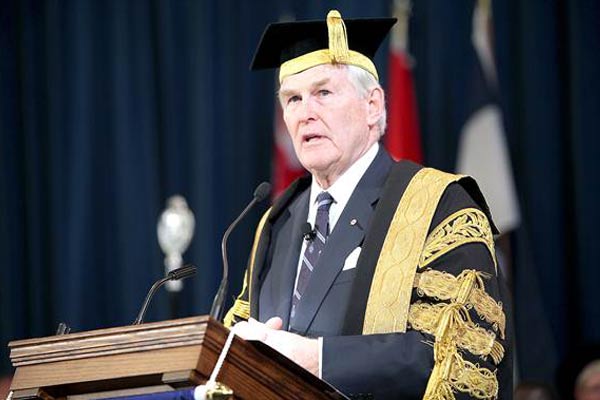
Chancellor Michael H. Wilson prepares for Convocation
Published: May 31, 2013
As chancellor, the Honourable Michael H. Wilson is the ceremonial head of the University of Toronto, presiding at convocations, conferring all university degrees and acting as ambassador to more than 500,000 graduates worldwide and to the wider community.
A former Canadian ambassador to the United States and former federal Minister of Finance, Wilson graduated from of U of T’s Trinity College in 1959 and served as chancellor of the college from 2003 to 2006. In 2005, the university conferred an honorary Doctor of Laws degree upon Wilson in recognition of his exemplary and long-standing volunteer leadership and outstanding community service.
U of T News caught up with Wilson as he prepared for his first spring Convocation season.
What do you enjoy most about Convocation?
It’s fun having a brief chat with the graduates as they come forward. Most of them have huge smiles because it’s an exciting day and they’re looking forward to their future. You also see the moms and dads and how very proud they are.
What did you find most challenging about the fall Convocation?
Convocation is a busy time, but it isn’t a challenging time. You’re meeting lots of happy people. It’s the greatest part of the great privilege of being Chancellor, helping to celebrate our students’ achievements, and to see them join our global alumni community.
What advice would you give new graduates?
You’ve worked hard learning during your time here, but you’re just starting to learn. You’ve been learning how to learn. You want to always try and keep an upward tilt to your learning curve. I’ve had a number of jobs over the years and it’s rare I take on something that isn’t a continuation of the learning curve.
You are a U of T alumnus (Trinity, 1959) and you’ve remained involved with U of T.
I have remained involved with U of T; it’s been a big part of my life. I’d like to invite graduating students not to forget your university. Keep in touch with your friends and mentors, go to your class functions, and if you can, try to support the university – there are so many ways to contribute, and in particular as a volunteer or financially because much financial support is directed to younger people coming to U of T and who will benefit greatly from it.
What was your own U of T Convocation like?
Actually, I couldn’t attend – I was on a boat to England for my first job. I missed that excitement of going up and shaking hands with the President and Chancellor, and the thrill of passing that important milestone in my life. But I have many great memories of my student days at U of T, a lot to be grateful for.
Did former Chancellor David Peterson give you any tips about Convocation?
The thing he stressed was to enjoy myself and have fun as Chancellor. There are so many opportunities to do wonderful things, to meet interesting people and participate in student life, particularly at Convocation.
Have you been practicing the Latin you’ll be saying during the ceremony?
I practiced my Latin for the fall Convocation and I’ll be practicing again. Andy Orchard, who in addition to being Provost at Trinity College is an expert in medieval languages and history,and speaks Latin, provided me with some pronunciation tips.
The graduates today will be entering an uncertain world. Do you have some final counsel on how they can keep their confidence strong?
I’d say, don’t fear change, but look forward to it as a challenge. When I’ve decided on changes in my career, I always looked upon the opportunity as an exciting challenge and a way to learn more about things, and about people.
I’ve noticed that people who don’t look forward to change don’t have nearly as exciting a life! Change is an important part of life and we should take the opportunity to benefit from it.



